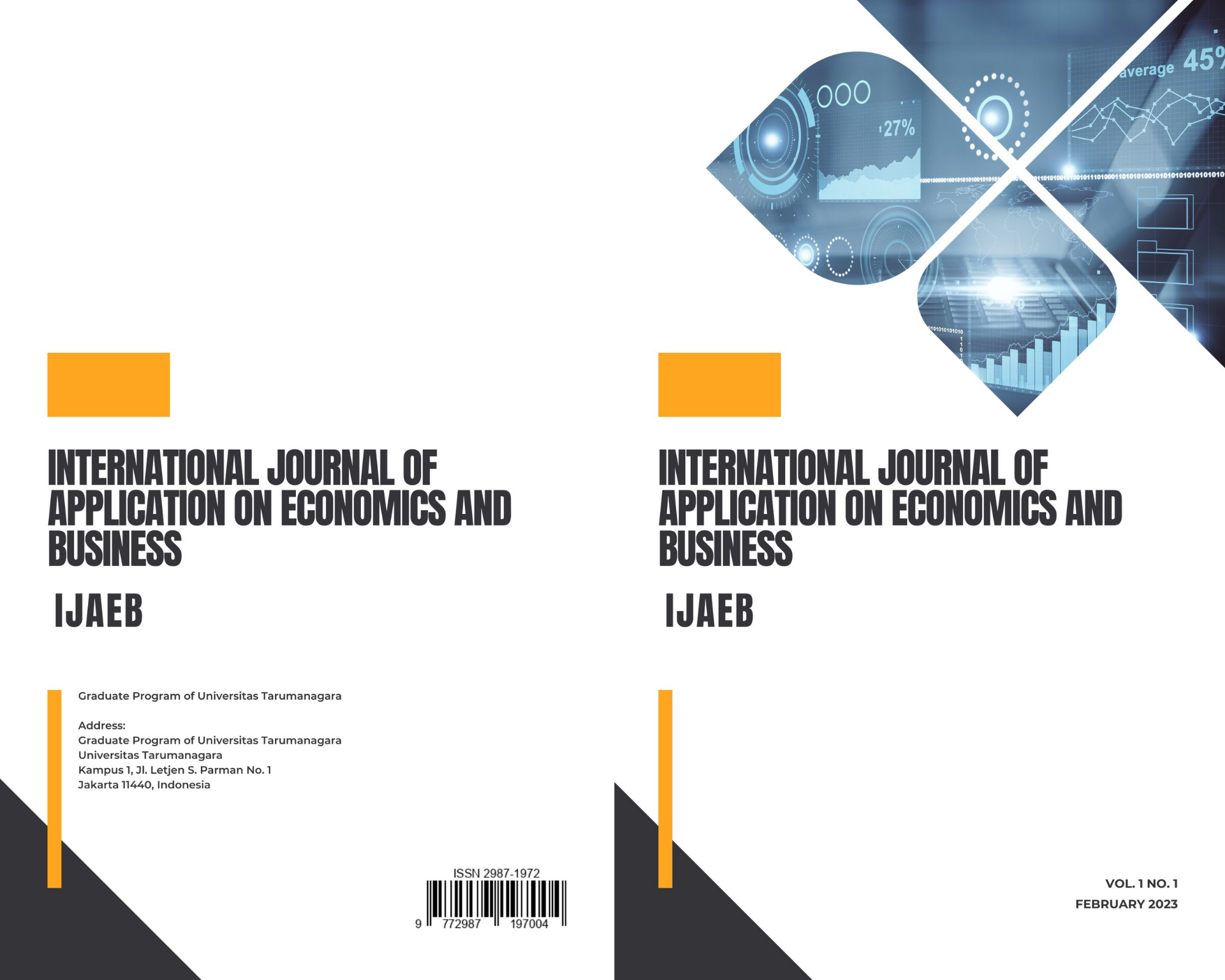Fostering The Sense of Eco-Innovation Among Entrepreneurs
Main Article Content
Abstract
In line with the target of achieving sustainable development goals in 2030, the sustainability issues must be the foundation for building a competitive advantage for the company. Likewise, for micro, small and medium enterprises (MSMEs) to apply sustainability aspects in building sustainable competitive advantages. Therefore, the research objective is to analyze various factors affecting the sustainability of the competitive advantage of MSMEs in West Jakarta. Based on a prior study, three variables were selected, namely eco-innovation, eco-regulation, and green product behavior as determinants for sustainable competitive advantage. As many as 100 MSMEs were selected as respondents using a purposive sampling technique. Data were collected based on a questionnaire with quantitative analysis techniques using structural regression. Data processing using Smart-PLS with the following results: eco-regulation and green product behavior have a significant influence on sustainable competitive advantages. The influence of the formation of competitive advantage by the two variables is well perceived by business actors. Otherwise, eco-innovation has no significant effect on the sustainability of competitive advantage. Therefore, it is necessary to educate MSMEs to foster a sense of eco- innovation among MSMEs to support a green economy which ultimately contributes to the achievement of sustainable development. In the end, the collaboration of three variables as a mechanism to build a sustainable competitive advantage.
Article Details
Section

This work is licensed under a Creative Commons Attribution-NonCommercial-ShareAlike 4.0 International License.
This journal provides immediate open access to its content on the principle that making research freely available to the public supports a greater global exchange of knowledge.
IJAEB by Graduate Program of Universitas Tarumanagara is licensed under a Creative Commons Attribution-NonCommercial-ShareAlike 4.0 International License.. Permissions beyond the scope of this license may be available at https://journal.untar.ac.id/index.php/ijaeb
References
M. Porter, and C. van der Linde. “Toward a new conception of the environment competitiveness relationship”. The Journal of Economic Perspectives, vol. 9, No. 4, 1995, pp. 97-118.
K.H. Kim., B.J. Jeon., H.S. Jung., W. Lu., and J. Jones, “Effective employment brand equity through sustainable competitive advantage, marketing strategy, and corporate image”. Journal of Business Research, 65(11), 2012, pp. 1612–1617. doi:10.1016/j.jbusres.2011.02.047
P. Aghion. “Entrepreneurship and growth: lessons from an intellectual journey”. Small Bus Econ, 48, 2017, pp. 9–24. Doi: 10.1007/s11187-016-9812-z
I.W.E. Arsawan, V. Koval, I. Rajiani, N.W. Rustiarini, W. G. Supartha, and N. P. S. Suryantini, “Leveraging knowledge sharing and innovation culture into SMEs sustainable competitive advantage,” Int. J. Product. Perform. Manag., 2020, doi: 10.1108/IJPPM-04-2020-0192
J.G. Liobikienė., J. Mandravickaitė., and J. Bernatonienė. “Theory of planned behavior approach to understand the green purchasing behavior in the EU: A cross-cultural study. Ecological Economics”, 125, 2016, pp. 38–46. doi:10.1016/j.ecolecon.2016.02.008
J. Hojnik., and M. Ruzzier. “What drives eco-innovation? A review of an emerging literature”. Environ. Innovation Soc. Transitions, 2015, http://dx.doi.org/10.1016/j.eist.2015.09.006
J. Doran., and G. Ryan. “Regulation and firm perception, eco-innovation and firm performance,” Eur. J. Innov. Manag., vol. 15, no. 4, pp. 421–441, 2012. doi: 10.1108/14601061211272367
C.C.J. Cheng, C.L. Yang, and C. Sheu. “The link between eco-innovation and business performance: A Taiwanese industry context,” J. Clean. Prod., vol. 64, pp. 81–90, 2014. doi: 10.1016/j.jclepro.2013.09.050
M. Nasrollahi., M.R. Fathi., and N.S. Hassani, N.S. “Eco-innovation and cleaner production as sustainable competitive advantage antecedents: the mediating role of green performance”, Int. J. Business Innovation and Research, vol. 22, No. 3, 2020. pp. 388–407
K. Mady, M.A.S. Abdul Halim, and K. Omar, “Drivers of multiple eco-innovation and the impact on sustainable competitive advantage: evidence from manufacturing SMEs in Egypt,” Int. J. Innov. Sci., 2021, doi: 10.1108/IJIS-01-2021-0016.
C.N.L. Tan., A.O. Ojo., and R. Thurasamy. “Determinants of green product buying decision among young consumers in Malaysia”. Young Consumers. 2019. Doi: 10.1108/yc-12-2018-0898
R. Dewi and A. Rahmianingsih, “Increasing Company Value Through Green Innovation and Eco-Efficiency,” J. Ekon Expansion. Finance, Banking. and Accounts, vol. 12, no. 2, 2020, pp. 225–243. doi: 10.35313/ekspansi.v12i2.2241
W. Cai and G. Li. “The drivers of eco-innovation and its impact on performance: Evidence from China,” J. Clean. Prod., vol. 176, pp. 110–118, 2018, doi: 10.1016/j.jclepro.2017.12.109
J. Hojnik., and M. Ruzzier, M. “The driving forces of process eco-innovation and its impact on performance: Insights from Slovenia”. J. Clean. Prod., 133, 2016, pp. 812–825. https://doi.org/10.1016/j. jclepro.2016.06.002
J.C.F. De Guimarães., E.A. Severo., and C.R.M. de Vasconcelos. “The influence of entrepreneurial, market, knowledge management orientations on cleaner production and the sustainable competitive advantage”. J. Clean. Prod., 174, 2018, pp. 1653–1663. doi:10.1016/j.jclepro.2017.11.074
H.E. Marchel., and K. Nuringsih. “Entrepreneurial Education, Green Entrepreneurial Orientation, and Green Value of Ecology Entrepreneurial Intention.”, J. of Managerial and Entrepreneurship, Vol. II (4), 2020, pp. 914-924
K. Nuringsih., and M.N. Nuryasman. “The role of green entrepreneurship in understanding Indonesia economy development sustainability among young adults”. Estudios de Economia Aplicada, vol. 39, issue 12, 2021. https://ojs.ual.es/ojs/index.php/eea/article/view/6021
K. Nuringsih, M.N, Nuryasman, I. Prasodjo., and R. Amelinda, "Sustainable entrepreneurial intention: the percieved of triple bottom line among female students", Jurnal Manajemen, Vol. XXIII (02), June, 2019, pp.168-190. DOI: https://dx.doi.org/10.24912/jm.v23i2.472

